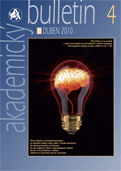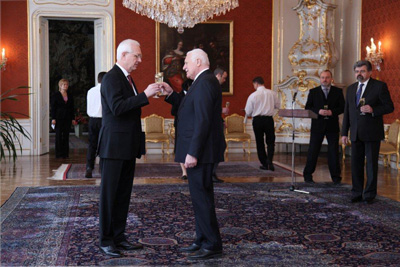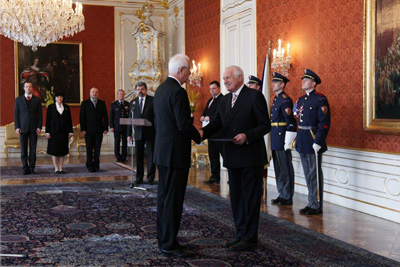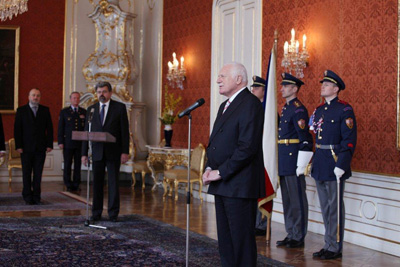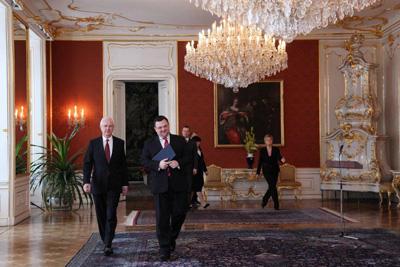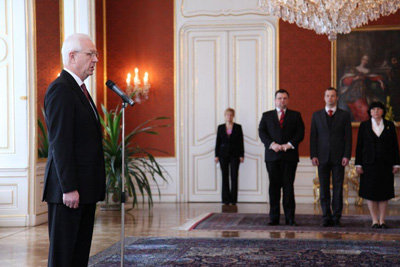public non-university research institution, which comprises a system of scientific institutes. It conducts its activities in accord with Act No. 283/1992 Coll., On the Academy of Sciences of the Czech Republic (ASCR), and other legal regulations. Research conducted by the ASCR endeavours to advance knowledge on an international scale while however respecting the current needs of Czech society. The supreme autonomous body of the ASCR is the Academy Assembly. The executive body of the ASCR is the Academy Council with the President of the ASCR at its head. Its permanent advisory body is the Council for Sciences, which deals with the scientific policy of the ASCR. These all-academic bodies are always elected for four-year periods.
Prof. Jiří Drahoš has been appointed President of the ASCR for another term
Photo: Stanislava Kyselová (Akademický bulletin)
Prof. Jiří Drahoš has been appointed President of the ASCR for another term
14 Feb 2013
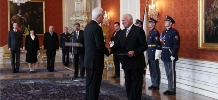
European science journalists in the Czech Academy
21 Mar 2013

Academic bulletin headed by Editor-in-chief Marina Hužvárová (the Czech EUSJA representative) organized the EUSJA General Assembly, which was held in Prague on March 13–17, 2013. A group of journalists from 22 European countries visited the headquarters of the Academy of Sciences of the Czech Republic and also the Lysolaje Campus for two-day Study Trip. During the first day they were shown around the Academy of Sciences Library and were given a lecture of popularization activities in the Centre of Administration and Operations of ASCR. The tour was closed with an evening concert in the beautiful setting of the Czech Museum of Music.
Prof. Jiří Drahoš has been appointed President of the ASCR for another term
14 Feb 2013

Open letter to the Ambassador of the Republic of Italy
26 Oct 2012
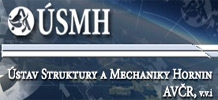
Professor Antonín Holý, the discoverer of new antiviral drugs, has died
16 Jul 2012

Israeli Nobel Laureates Visited Prague
4 Jun 2012
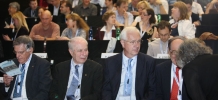
Four laureates of the Nobel Prize from Israel – Ada Yonath (Weizmann Instiute, Rehovot, Nobel Prize 2009), Aaron Ciechaonover (Technion, Nobel Prize 2004), Avram Hershko (Rappaport Institute, Haifa, Nobel Prize 2004) and Dan Schechtman (Technion, Nobel Prize 2011) – visited Prague on the last days of May. They attended the conference Prague Nobel Get-Together at Prague’ National Technical Library (30–31 May), which was jointly arranged by the Institute of Organic Chemistry and Biochemistry of the ASCR, The Academy of Sciences of the CR and the Embassy of the State of Israel in the CR. Besides the Nobel Prize laureates, also other significant personalities from the fields of chemical biology, material sciences and structural biology appeared within this event.
The King of Sweden with a Royal Technology Mission on a Visit of the Academy of Sciences of the CR
11 May 2012
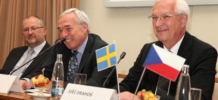
Fast manipulation of a magnet by light
1 Apr 2012

A discovery of Czech physicists published in Nature Physics
A direct transfer of angular momentum from a circularly polarized light to spins allows to excite a magnet from its equilibrium state at sub-picosecond time scales. The discovery, allowing to manipulate spins in a magnet by short laser pulses, was reported by scientists from the joint Laboratory of Opto-Spintronics at the Faculty of Mathematics and Physics, Charles University and the Institute of Physics, Academy of Sciences of the Czech Republic. The work was published on April 1st 2012 in the journal Nature Physics.
Václav Havel in Contemporary History
20 Mar 2012

Syncytin – A good servant but a bad master
29 Feb 2012
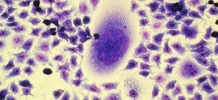
Milk Thistle and Green Tea against Cancer
21 Jan 2012
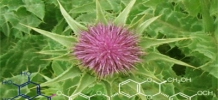
Czech scientists have developed new anti-cancer substances
New possibilities in the treatment of cancer diseases have been opened by a discovery by Czech and Spanish researchers. The team of prof. Vladimír Křen from the Institute of Microbiology (MBÚ) of the ASCR along with the team of prof. Jitka Ulrichová from the Faculty of Medicine of Palacký University in Olomouc and with scientists from Universidad de Málaga in Spain have developed new derivatives with antiangiogenic activity on the basis of silybin ‒ substances obtained from milk thistle (Silybum marianum).
White Nose Syndrome: Can Czech Bats Help American Bats?
20 Jan 2012
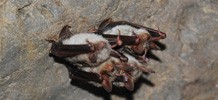
An Article by Czech Scientists in the Journal of Wildlife Diseases
Scientists from Moravian workplaces have proved that bats here suffer from white-nose syndrome, a fungal disease that is threatening the ecosystem in North America. In the Czech Republic as well as in other parts of Europe, bats with this syndrome die only very rarely and the disease has not yet caused a decline in the population numbers. Uncovering the cause of ‘European immunity’ could save North American bats and avert also the disruption of the biological balance in that part of the world.
My Meeting with Václav Havel
20 Dec 2011



